Posted: November 17th, 2015 | Author: Matt | Filed under: personal | Tags: Bucher, horses, legend, LeoSBucher, LSB, RTBucher | No Comments »
I’ve written about my great-grandfather in the past but I continue to research the stories about his life and try to see if there is any existing evidence to support some of the details of his life. There are still many questions I have but today would have been his 125th birthday and I wanted to document one of those stories.
On June 12, 1910, in Powersville, Missouri, Leo Steven Bucher was helping his soon-to-be adopted father R.T. Bucher wash their horses and buggy. They led the horses into the pond, wherein one of the horses laid down and got tangled up in the harness and eventually both horses drowned.

From his 1910 diary:
Drowned tow horses [two horses?] (Black) (One Horse & one mare). Drove in pond to wash wheels, horse laid down and pulled mare over him, got tangled in harness.
The next day, they buried the team of horses:
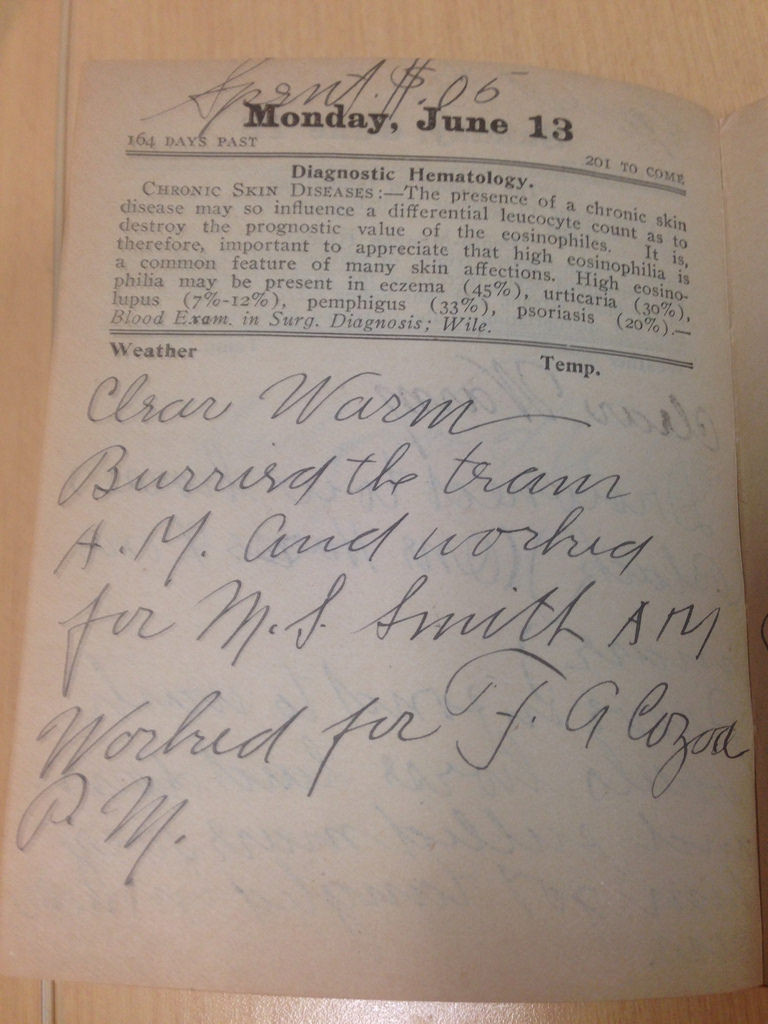
Amazingly, this story was picked up by the local newspaper, the Unionville Republican, and even ran as 10-years-ago item in 1920.
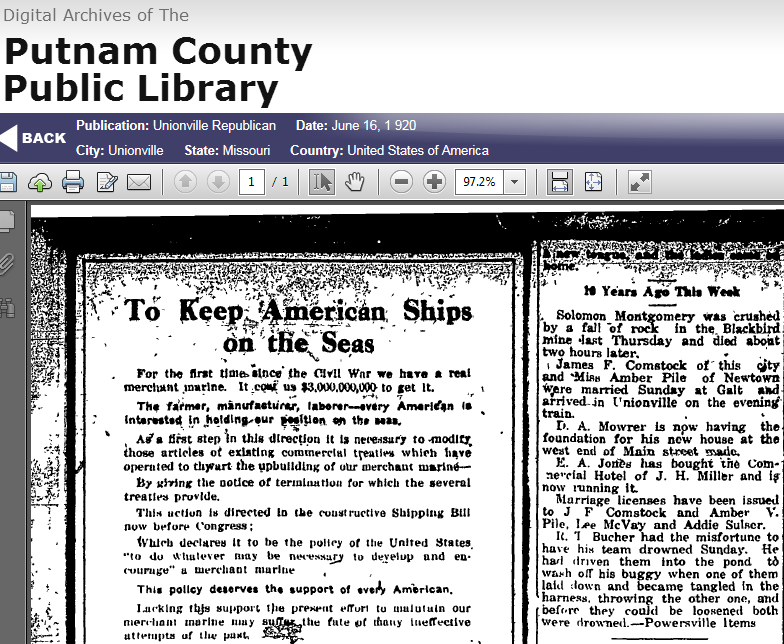
R.T. Bucher had the misfortune to have his team drowned Sunday. He had driven them into the pond to wash off his buggy when one of them laid down and became tangled in the harness, throwing the other one, and before they could be loosened, both were drowned.
In 1910, this was a very serious problem as a horse was the main mode of transportation and work. It was equivalent to losing both your cars and your tractor on the same day. In a time before insurance, it could be very expensive to replace two horses.
For some time, this story was told as an origin story – that R.T. and Alice Bucher had another son who drowned in a pond with some horses. The reality is much different. Leo Bucher was already living with the family by that point and might have even contributed to the drowning of the horses (since he states in his diary “Drowned two horses)). In fact, I can find no evidence that RT and Alice Bucher ever had any other children besides Leo, whom they adopted when he was 21 years old. It’s likely that they took him in because they were unable to have children of their own.
Posted: November 11th, 2014 | Author: Matt | Filed under: personal | Tags: 88thDivision, army, Belan, Bucher, bugler, family, LSB, WWI | 1 Comment »
This Veteran’s Day I find myself thinking of a man I never met: my great-grandfather Leo Steven Bucher. He was born in 1890 in Berlin, Germany, and died in 1955 in Dallas, Texas. His parents were named Paul and Elisabeth Belan, and they emigrated to the US in December 1901. They settled in Chicago, working menial jobs in factories and restaurants, but Leo escaped. Sometime between 1906 and 1907 he jumped on a freight train and began tramping around the United States. (I’m condensing some of this story here.) In 1908 he fell ill while riding a train across northern Missouri and hopped off near a tiny town called Powersville. There he was sheltered and raised by a childless couple: Reuben T. and Alice A. Bucher. The Buchers formally adopted Leo at the age of 21 and he went into business with his adopted father: R.T. Bucher & Son. Together they owned several businesses in Powersville including a mercantile, a Sinclair filling station, and a restaurant. Reuben was active in the small Masonic lodge in Powersville and had his son initiated into the lodge in 1913. (In 1905, Reuben and Alice Bucher helped form Order of the Eastern Star Chapter #278 in Powersville, Missouri. They were both charter members and Alice was installed as the Chapter’s first Associate Matron.)
From 1914-1916 Leo Steven attended Chillicothe Business College (in Missouri) and the N.E. Missouri State Teacher’s College (now called Truman State University) in Kirksville, Missouri, studying business and mathematics.
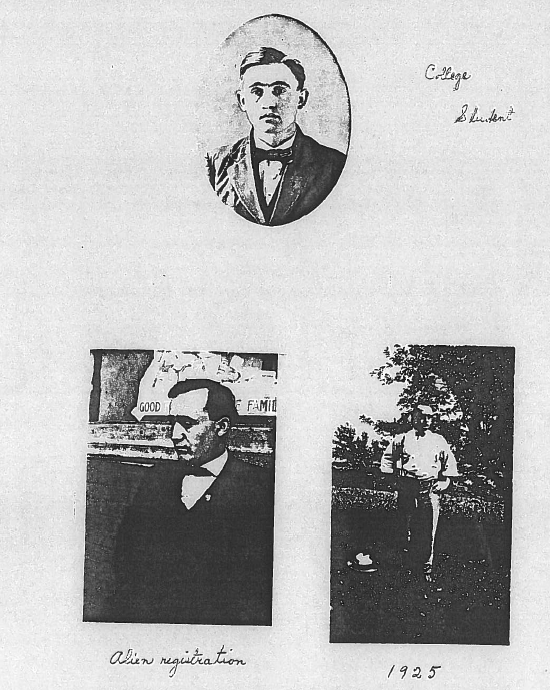
The United States formally declared war on Germany on April 6, 1917. One month later President Wilson enacted a draft, requiring all males age 21-30 to register for service. Leo Steven Bucher was drafted into the US Army on June 5, 1917. He was sent to Camp Dodge, Iowa, but was sent back to Powersville because he was still a German citizen. He was not allowed to enlist and was thrown in jail. The problem was he had no proof of legal US residency, only an alien registration card and his adoption papers. His adopted father Reuben intervened on his behalf and after several tense days he was released and allowed to enlist before the next expansion of the draft. Leo S. Bucher officially entered the army on May 25, 1918. He was conveniently made a US citizen at the Polk County Court House in Des Moines on June 13, 1918.

[courtesy of David Bucher]
At Fort Dodge, Leo S. Bucher (above, in uniform) was given the rank of Bugler, at that time equivalent to Private. Here is his Infantry Drill Regulations manual which outlines the duties of the Bugler and includes sheet music for different calls.
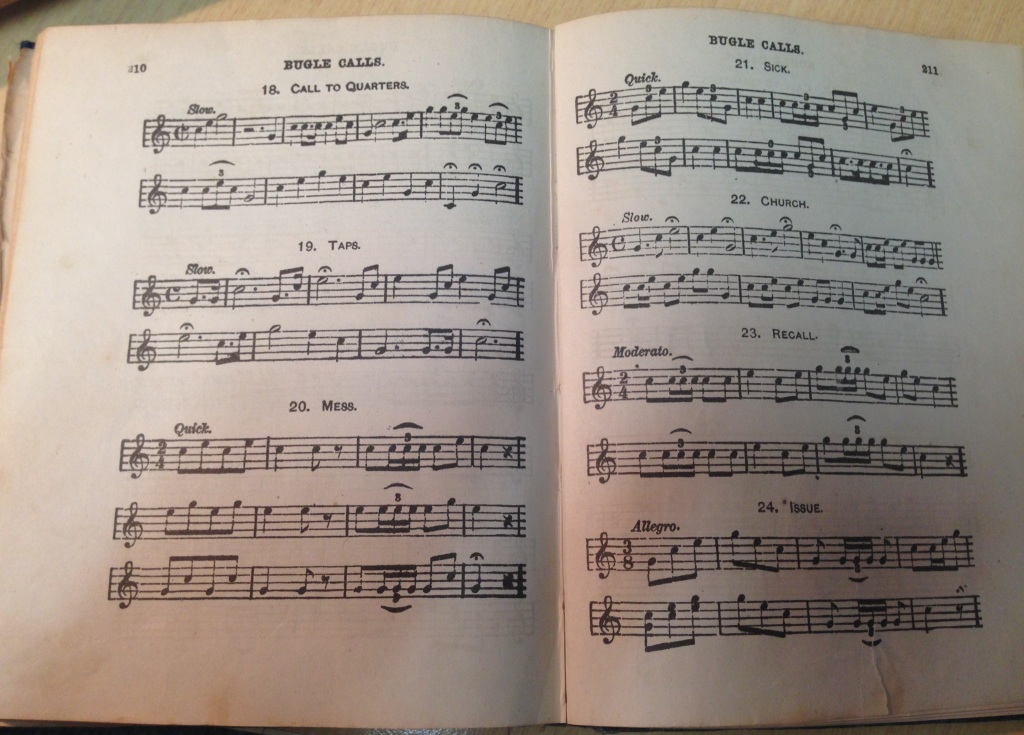
[courtesy of James Bucher]
Here is his bugle:
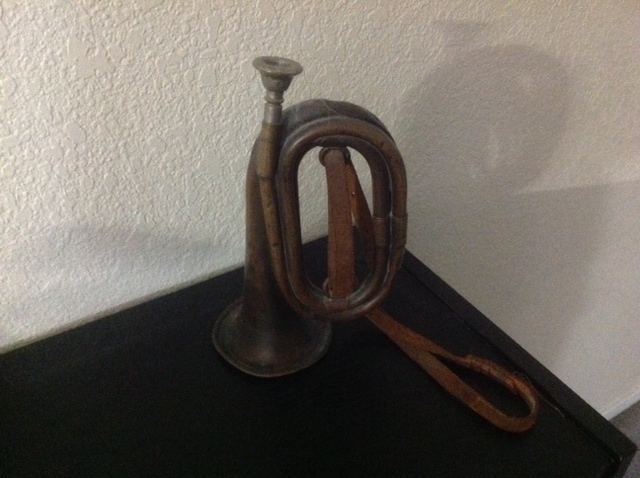
[courtesy of David Bucher]
The soldiers at Camp Dodge were almost all residents of Iowa and northern Missouri. They were part of the Army’s 88th Division and Leo was assigned to C Company, 351st Infantry, 88th Division (Clover Leaf Division) “ part of the AEF, American Expeditionary Force. There is an excellent history of the 88th Division in World War I here:
http://distantcousin.com/Military/wwi/units/usa/88thDivision/index.html
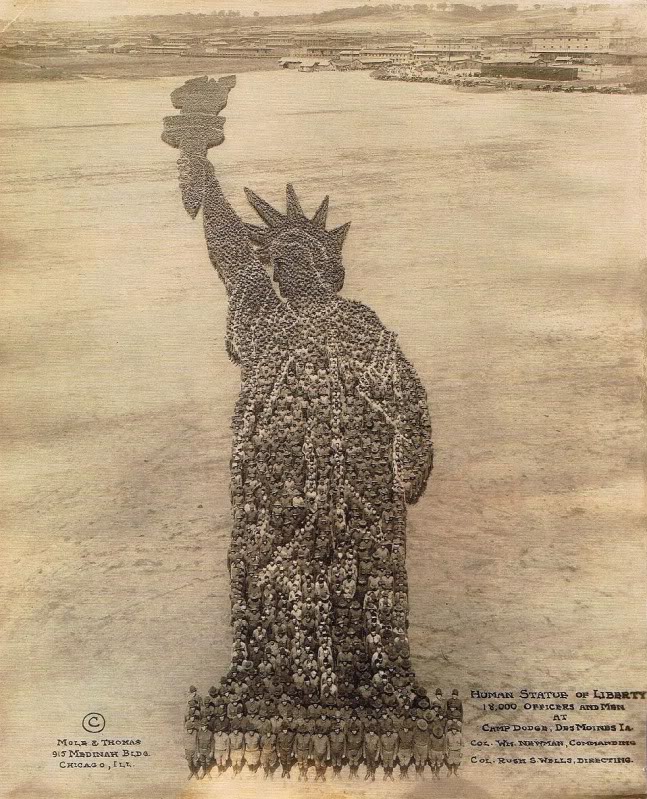
[Human Statue of Liberty – 18,000 officers and men at Camp Dodge, Des Moines, IA, courtesy of Wikipedia]
Company C shipped out to France on August 16, 1918, arriving in Le Havre on September 4. The Division moved by rail from Le Havre to Semur, Cote d’Or, and then to Belfort, France, freeing up the 29th Division to capture enemy artillery positions in the area. In October 1918 Leo was wounded by bomb shrapnel outside of Gommersdorf, France (Southern Sub-Sector) and recovered at a nearby farmhouse. By the time he returned to the 351st Infantry at Belfort, armistice had been declared (November 11 – 96 years ago today) and the war was over. The 88th Division spent the next nine months in France demobilizing, training, attending schools, playing sports, staging plays, and preparing for their return to the United States.
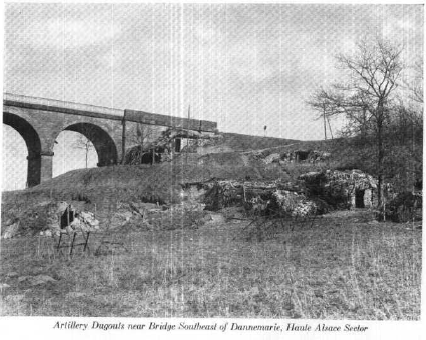
Near the end of their demobilization, the 88th Division spent several weeks in Paris sightseeing and celebrating. I am fortunate to have with me a postcard that Leo Steven Bucher sent to his father Reuben from Paris:
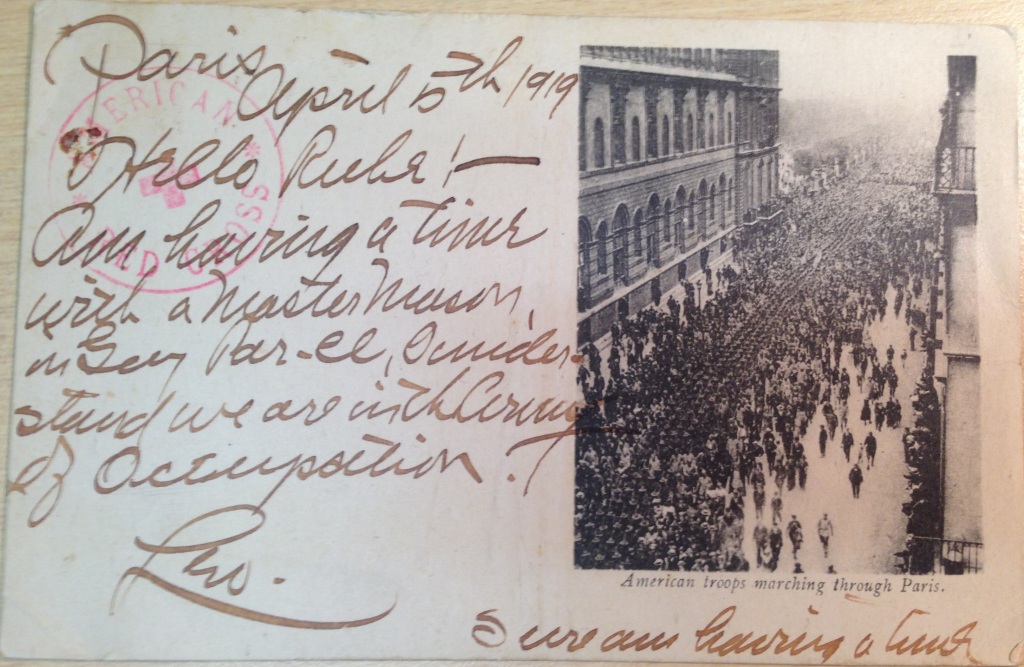
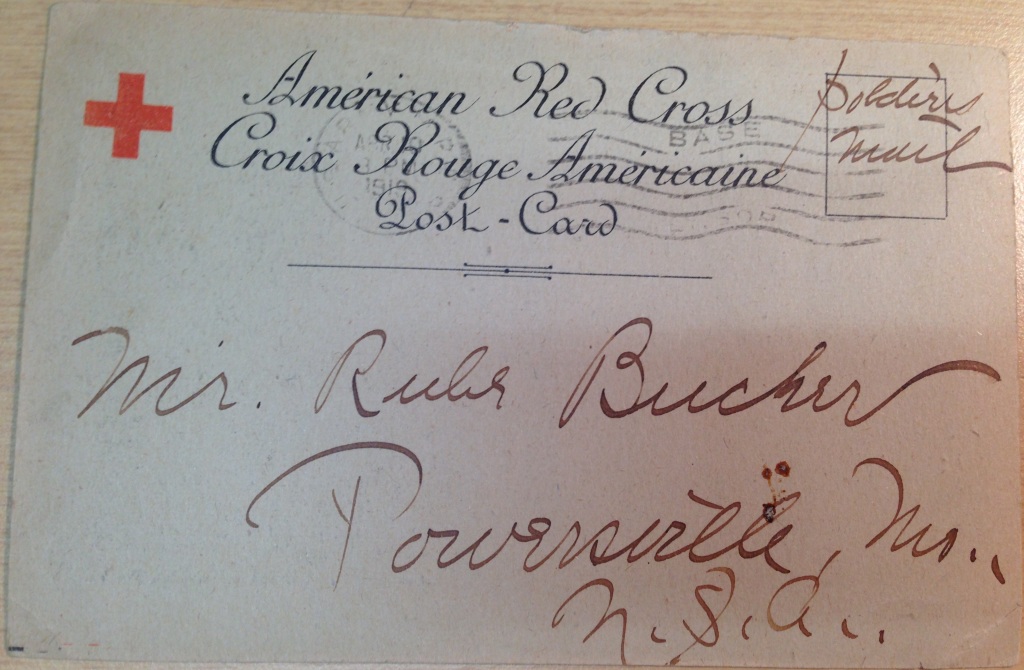
[Paris, April 5th, 1919
Hello Rube!
Am having a time with a Master Mason in Gay Par-ee! Understand we are in the Army of Occupation.
Leo.
Sure am having a time]
He returned to the United States on May 31. On June 9, 1919, he was formally discharged from the military at Camp Zachary Taylor in Louisville, Kentucky. {The novelist F. Scott Fitzgerald also trained at Camp Zach Taylor and mentions it in The Great Gatsby.}
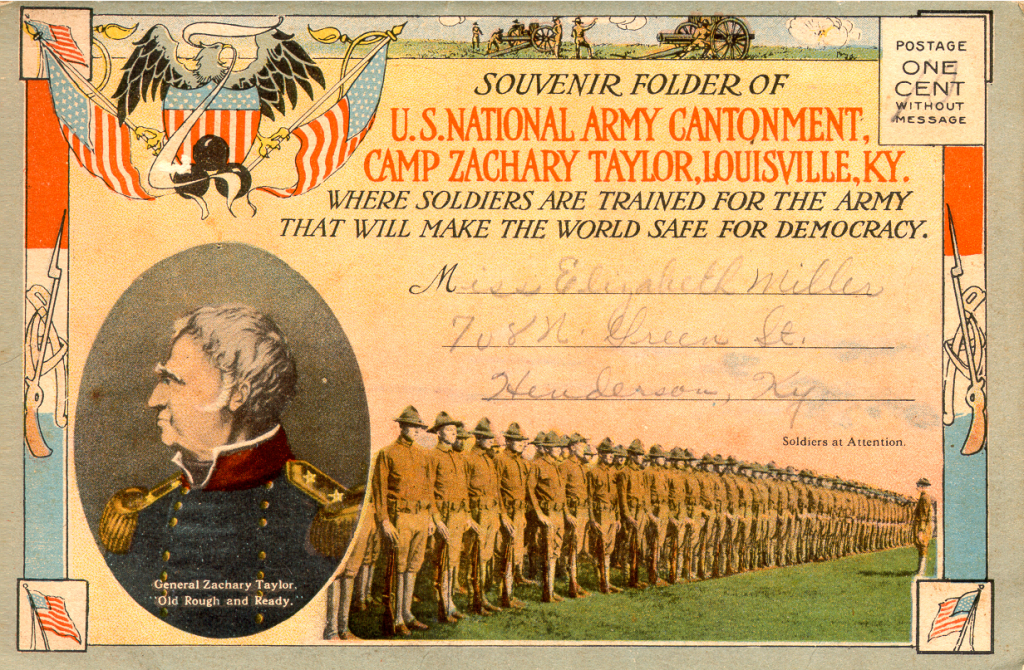
After he returned to Powersville, he met a young Iowa girl named Mary and the two were married in Centerville, Iowa, on May 20, 1924. He was 33, she was 23. They had three children: David Reuben, born 1925, Alice Allene, born 1926, and my grandfather, Leo Warren, born 1929. Reuben entered the Army in March, 1943 and after 20 years service in the medical corps, he was discharged in 1963. Leo Warren entered the Army on November 5, 1950 at Fort Hood, Texas, and was discharged November 28, 1951 at Camp Polk, Louisiana. He served in the 193rd Heavy Tank Battalion.
There is much more to the story of Leo Steven Bucher and I am working on a longer project about his life. But today I wanted to remember him as a war veteran.













